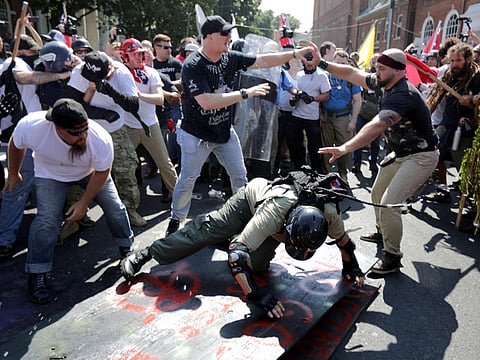The ‘moral obtuseness’ of America
People around the world are sickened to see Nazi salutes being flaunted in 21st-century US

The image from Charlottesville, Virginia, is strikingly resonant. An image of Nazis, Klansmen and white supremacists, wielding torches in a normally serene American college town, whose violence resulted in the death of one young woman and injury to 19 others. The image shocked not just Americans at home but people abroad as well, who looked on in horror at how all this was happening at this time in American history, decades after Martin Luther King delivered his iconic “I have a dream” speech and the Civil Rights Act and Affirmative Action passed by the United States Congress — developed as a set of principles aimed at equity for deprived minorities in need of a helping hand — became a norm in America’s everyday life.
In short, people around the world, and in America, were sickened to see Nazi salutes flaunted in 21st-century America, the leader of the free world.
Political commentators and government officials, all the way from Germany to China and from Britain to Russia, expressed their consternation, each extrapolating from their own long-held cultural beliefs. In Britain, for example, Prime Minister Theresa May, taking US President Donald Trump to task for failing to blame supremacists outright, said there’s no “equivalence” between “fascist protesters” and their opponents. In Germany, Chancellor Angela Merkel, whose country had long since outlawed hate speech and Nazi salutes, said the violence unleashed in Charlottesville was “sickening”. Other reactions were equally sharp.
In Russia, the state-run Novosti news agency, resurrecting Marxist metaphors from the olden — though not golden — days of the Soviet Union, attributed the violence to class dichotomies, or to what it called the growing disparity “between rich and poor” in America. And in China, the China Daily newspaper referred to it as a “disease” in US society “that will not be easy to cure”. And so it went.
Meanwhile, Trump went into an inexplicable flip-flop on the issue, initially blaming “both sides” in equal measure for the violence, then blaming the “evil of racism”, then at a contentious, mostly erratic press conference at Trump Tower in New York last Tuesday, doubling down on his belief that “both sides were to blame”, introducing to the American lexicon the term “alt-left”, that is, putting the left-leaning, anti-racist counter-protesters on the same moral plane as the alt-right supremacists.
Shortly after that, an exultant David Duke, former Wizard of the Ku Klux Klan, and currently an active figure in white nationalist circles — a xenophobic, anti-Semitic and Islamophobic group that has grown ever more emboldened since the US presidential election campaign last year — tweeted: “Thank you President Trump for your honesty & courage to tell the truth.”
My, my, what divisive times we live in.
In a news analysis piece on the front page of the New York Times the following day, we read: “President Trump buoyed the white nationalist movement on Tuesday as no president has done in generations — equating activists protesting racism with the neo-Nazis and white supremacists who rampaged in Charlottesville, Va., over the weekend, angrily asserting that so-called ‘alt-left’ activists were just as responsible for the bloody confrontation as marchers brandishing swastikas, Confederate battle flags, [and] ant-Semitic banners ...” In an editorial the same day, the Washington Post was no less scathing, bemoaning what it called “the moral obtuseness” of the American chief executive, who appeared, it said, to be giving “comfort to racists”. “That car in Charlottesville did not kill or wound just the 20 bodies it struck. It damaged the nation. Mr Trump not only failed to help the country heal; he made the wound wider and deeper,” it opined.
The US president could have done better than embracing the false equivalence between racists and counter-racists. That, I say, is an unfortunate moral posture to be held by the president of a big power that prides itself on being leader of the free world in our time. Let us hope America sees light at the end of the tunnel and all the bigotry on display right now is reduced to an aberration that contradicts the values of this great democracy.
Fawaz Turki is a journalist, lecturer and author based in Washington. He is the author of The Disinherited: Journal of a Palestinian Exile.


